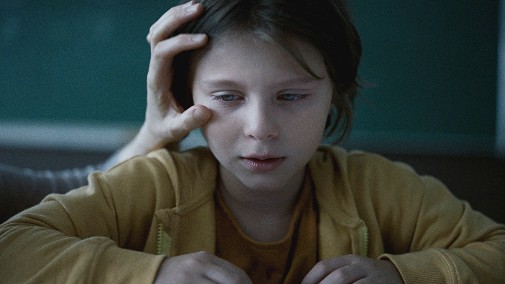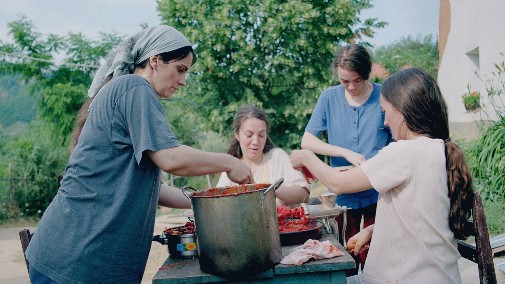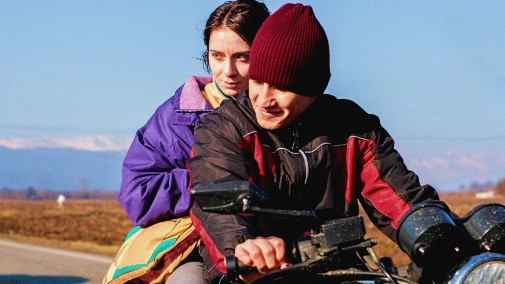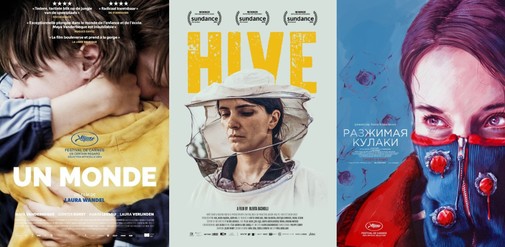Best International Film: Belgium, Kosovo, Russia
 Monday, December 13, 2021 at 6:00PM
Monday, December 13, 2021 at 6:00PM Our odyssey through the Best International Film submissions continues, this time focused on women behind the camera. As Juan Carlos' series Through Her Lens reminds us, there's a wealth of women directors every year whose work gets forgotten in lieu of their male counterparts. Of course, that's true in the Best Director Oscar race, but it also applies to every other category, including this one. From schoolyard bullying shot as psychological warfare to the physical aftermaths of an unspoken massacre, the submissions from Belgium, Kosovo, and Russia showcase the talent of female artists who explore many shades of brutality through a woman's point-of-view…

PLAYGROUND (Belgium)
Watching Laura Wandel's first feature, one is reminded of such harrowing films as Son of Saul. Like László Nemes, this Belgian filmmaker promotes a sense of psychological immersion through formalistic means. Hand-held camerawork that centers the protagonist dominates the visual language, full of claustrophobic compositions so obsessively close to the actor that the surrounding world turns into an abstraction from which heightened sounds can penetrate, attack. The screen rarely shows us anything beyond the character's field of vision, trapping us to their subjective experience. Even the person's stature is a factor since the camera is usually eye-level.
Only, Playground isn't about a Nazi concentration camp. Instead, as its title indicates, the film concerns the quotidian drama that unfolds in schools. It may sound idiotic to make such comparisons, but there's a great deal of empathy to the way Wandel captures her kid characters. Instead of looking down on them, the director forces us into their emotional world, seeing miniature tragedies as the seismic events they are for the children living through them. Specifically, Playground is the story of Nora. Going to the same school as her beloved older brother, Abel, she witnesses his relentless bullying at the hands of older kids. She wants to help, to tell, but he begs her not to.
Gradually, across its tight 72 minutes, the film dissects the moral quandary of a girl who wants to be a good sister, a loyal friend by blood, but doesn't know how. Attempts to sound the alarm go unnoticed until the violence has escalated to unbearable levels, worsening the situation. A culture of bullying harbors more aggression and teaches each kid to hate, to fuel their frustration into denigration of those with even less power than they have. Adults are not villains in this tale, just powerless individuals who, like Nora, want to do good but find themselves unable to enact any change. It's a heartbreaking film, formally rigorous and merciless, anchored by Maya Vanderbeque's spellbinding performance as a child whose soul is slowly crushed. B+

HIVE (Kosovo)
In essence, Hive is not unlike many a Hollywood crowd-pleaser, telling the true story of a woman facing adversity and, somehow, coming out on top. Inspired by Fahrije Hoti's life, we see how, after her husband disappeared in the Kosovo War, she faced the obstacles of a profoundly patriarchal society while trying to make a living. The beehives her husband left were not enough to provide for the family, their bees' sting too much to bear. So, she gathered a group of women under similar predicaments, a different sort of hive, and started her own business selling a pepper spread that quickly grew in popularity. Despite such an inspirational story, Basholli's film repudiates a sentimental approach, following the tenets of post-Dardenne European realism.
Furthermore, the ghost of recent war haunts everyone in Hive, its invisible scars forever pulsing, throbbing. There's no way to avoid it, as there's a regular supply of dead bodies to identify. Fahrije makes the trip to the improvised morgues many times, always coming back without her husband. Indeed, at a certain point, both the audience and her on-screen teen daughter come to question if the return of the man wouldn't be worse than the confirmation of his death. After all, her economic autonomy depends on that limbo, between likely widowhood and a wife's submissive duties. And yet, the script is unwilling to go deep into its heroine's psychology, preferring to observe from a distance even as the camera favors close-ups. That alienating tenor is further intensified by Yllka Gashi's performance in the lead.
Her visage conveys the stoicism a woman must embody to survive the systemic misogyny of early-21st century Kosovo while also hiding her interiority from the audience. Only after prolonged observation can we detect variations. At a certain point, someone asks her if she's pleased with a shop display, unable to guess her feelings. It's easy to see why they have to ask. Gashi only ever presents the faint hint of a smile, making Fahrije's happiness nearly indistinguishable from her annoyance. One commends the avoidance of histrionics, but the film's refusal to explore its characters' inner lives is frustrating, for it reduces them to cogs in the machine of social critique. Only Fahrije is ever allowed multidimensionality and, even then, it's shrouded by a veil of strategic reservation. B-

UNCLENCHING THE FISTS (Russia)
The scars of past trauma and the oppressive power of patriarchy are also present in Unclenching the Fists. In this bold Russian film, they manifest physically, materializing the ideas with visceral pain. Ada is a young woman living in a desolate mining town in North Ossetia, in the company of a needy little brother and a strict widowed father. Her body is littered with scars, lacerating reminders of a school siege she survived long ago, deep wounds that have left her with insufficiencies, incontinence, and shame. She knows surgery could revert some of these disorders, but the pater familias refuses to let her go to the hospital or anywhere away from him. He goes so far as to confiscate the apartment's key, making her a prisoner of his stubborn ways.
It's a nightmarish situation that director Kira Kovalenko captures with disquieting verve, privileging long takes that entrap us, just as unable to escape as Ada, just as unable to breathe. Notwithstanding the cutting edge of these filmic rhythms, Unclenching the Fists isn't as visually dour as one might suspect. Like Kantemir Balagov, a fellow student of Aleksandr Sokurov's North Caucasus filmmaking workshop, Kovalenko loves bright colors and unexpected formal flourishes. Her fluid mise-en-scène evokes a startling sense of place, a gritty environment that's unforgivable but not without beauty. Ada's favorite coat, for instance, is a shock of violet that both contradicts and complements the stony mountains that stand tall in every direction.
Whatever lyricism the director finds, it blossoms from the protagonist's resilience, her reluctance to give in to the misery, to be subsumed by agony. Even as the patriarch freezes in a paralyzed embrace or an inexperienced beau deflowers her in what may be the saddest (consensual) sex scene in recent memory, Ada perseveres. As played by Milana Aguzarova, she's the embodiment of Kovalenko's directorial style, an obstinate presence vibrating with intense emotion, such savage feelings that the screen feels ready to catch on fire at any moment. And yet, her tale doesn't enclose itself within a never-ending cycle of suffering. For Ada, there's hope at the end of the road. Sure, that hope comes tied to uncertainty, to the perils that freedom can cause, but it also holds the promise of a better future. B+
From these three films, Hive feels like the likeliest contender. Its Sundance victories certainly indicate it could be a strong contender. It's also the only one of these three to be theatricality released in America. By virtue of its theme, Playground may also end up on the Academy's shortlist. AMPAS seems to like films about bullying, as we can attest by looking at last year's Best International Film lineup. Unclenching the Fists is a more challenging proposition, though its boldness of vision, its sheer quality, might inspire voters.




Reader Comments (2)
These 3 are all "on the edge of getting into TOP15" for me - Belgium 17th, Kosovo 18th and Russia 21st.and having heard so many positive reactions to Belgium's "bully-film", I even consider it to have an edge over Kosovo and putting personal taste aside I'd guess it as one that will get into 15. But all the love Hive got at Sundance is undeniable. It can become this year's "Que vadis, Aida", being from the same corner of the world. Russia is iffy this year, but I guess it would be another "first", as never has a film in Ossetian language been nominated... For me it lacked a little bit of emotional punch.
By the way, I was sad, that Russia didn't choose "A siege diary", that would have made it to a final nomination for sure (winning the national best film prize + several other prizes and one of the best cinematographies of recent years, not to mention the closest chance of experiencing, what it really meant that people were starving fror 900 days and surviving those harsh winters with nothing to burn for the heat... well 1 million people died... But I wonder how many more would have, if they had known, that the siege would last that long... amazing film, even though it didn't get the boost from Russia's selection committee).
According to post, Heller was the victim of cyber bullying and has had to take time off from school. If a person in our society gets angry at someone on Facebook, it's not a choice. It's an automatic response that allows us to let out our frustration without having to confront another human being. When we're frustrated with our mate, we may let that anger out on Facebook or start talking trash about them but now you can visit https://samploon.com/free-essays/cyber-bullying/ site for cyber bullying. Unfortunately, there is nothing socially acceptable about doing that, so by acting like a fool online, you're gonna alienate your friends and make yourself look ridiculous.